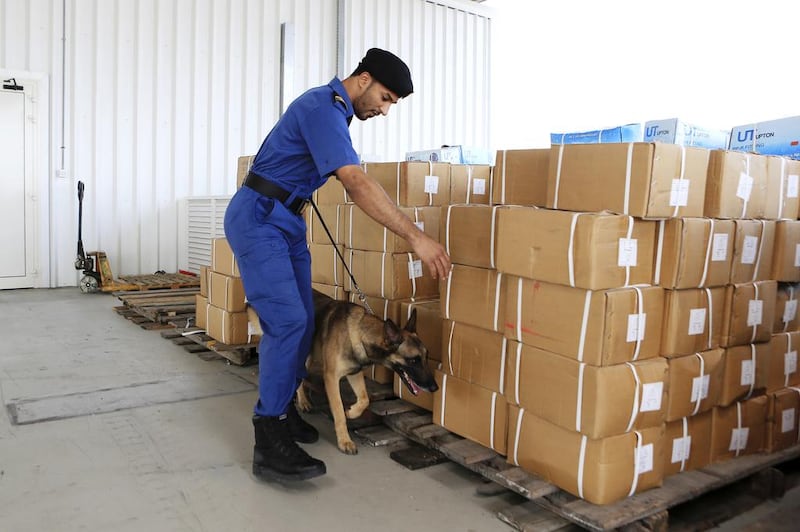A flurry of fake football shirts smuggled into Dubai ahead of the Fifa World Cup next month is the latest face of the booming counterfeit market.
The shirts are just a fraction of a varied flow of goods seeping into UAE ports on a daily basis. Luxury handbags, watches, car parts, beauty products, electronics and clothing are among the most frequently smuggled fake items.
Their prevalence has grown as the overall tide of goods into the country – and Dubai in particular – swells. Dubai Customs last month said it made 65 seizures of fake goods in the first quarter of the year, up from 59 seizures in the same period of last year. The value of the items seized rose from Dh2.4 million to Dh6.7m. Part of the rise in seizures can be attributed to the improving systems officials are deploying to detect smuggling.
Still, most within the industry accept the local counterfeit market is growing, although the total size remains unclear. The United Nations Office on Drugs and Crime estimated last year that counterfeit goods make up around 2 per cent of world trade, worth about US$250 billion a year.
“Dubai is the headquarters for multinationals and the transshipment hub for containers travelling East to West and West to East, so the [counterfeit] data reflect that,” says Omar Shteiwi, the chairman of the Brand Owners’ Protection Group (BPG), a regional organisation of multinationals and local companies formed in 2005 to protect intellectual property rights and fight for tougher laws.
Brand owners’ concerns are multiple. First, copycat goods erode their market share. Rashid Khan, the head of after-sales in the Middle East and North Africa at Nissan, the Japanese car maker, estimates that the company loses about $60m every year in the UAE from consumers buying brake pads, radiators, windscreens and other spare vehicle parts from counterfeiters. Across the GCC, he estimates the size of the counterfeit market in spare car parts at $2bn.
But they also warn of the potentially serious health and safety consequences to consumers from buying certain counterfeit goods.
“It’s one thing for someone to go out and intentionally buy a fake handbag but quite another when a consumer buys a beauty product or food item not realising it is not genuine. That can lead to health risks as counterfeiters don’t follow the same strict hygiene and safety rules,” says a regional representative from a multinational FMCG company who asked to remain anonymous.
Mr Khan warns of the dangers from consumers buying fake car parts.
“Say if you buy a fake windscreen, there is every chance in a crash that it might break into sharp pieces which could be harmful for the driver,” he says.
Then there is the potential cost to governments from fake goods. As they are usually smuggled into countries, the goods frequently circumvent customs duties and licensing fees.
The Government knows that the UAE’s emergence as a global centre for commerce hangs in the balance unless it can get to grips with the counterfeit challenge. Multinationals spanning technology to consumer goods base their regional headquarters here and many have complained about what they perceive to be the low penalties counterfeiters face if caught.
In response, the UAE is beefing up counterfeit legislation. In March the Federal National Council signed off a draft of the Prevention of Fraud in Commercial Dealings law. The law, which will come into force after publication in the Official Gazette, hands out fines of up to Dh250,000 to those caught dealing in counterfeit goods, with the penalty rising to Dh1m to those dealing in fake pharmaceutical or food goods. Offenders can also face imprisonment of up to two years. At the moment, such criminals face imprisonment of up to three years and fines of up to Dh10,000 under an existing version of the law, which dates from 1979. A separate Trademarks Law provides for imprisonment for up to one year and a minimum fine of Dh5,000. Under the new legislation, authorities will be able to close stores found to be selling fake goods and to cancel the trade license of repeat offenders.
The law will also address another bugbear of brand owners. Under existing regulations, customs officials can order imported goods found to be fake to be returned to the market where they originated. Brand owners were unhappy that the rules did not stop the copycat items being sold in other markets. But a clause in the new law states that such goods should be destroyed, rather than be shipped back to their original market.
“The new law is much better than the old one,” says Bassel El Turk, a senior associate at Rouse, the global intellectual property firm. “The only issue is that laws in the UAE tend to be not very clear in the way they’re drafted so we are waiting for the Ministry of Economy to issue more details on implementing the regulations which will offer more practical guidelines for companies.”
Lawyers also warn that the tightening of the UAE’s rules will likely mean criminals instead turn to other markets in the Arab world. If the size of the counterfeit market in the UAE is uncertain, in the wider region it is even trickier to estimate. But the market for illicit goods is generally believed to have risen in tandem with the instability rocking the region in recent years.
“There’s been less focus on illicit goods in places like Libya and Iraq as they have had more serious problems to deal with,” says Mr Khan. “But the majority of goods are flowing through the UAE, so it makes sense to nip it in the bud here.”
tarnold@thenational.ae
Follow us on Twitter @Ind_Insights





